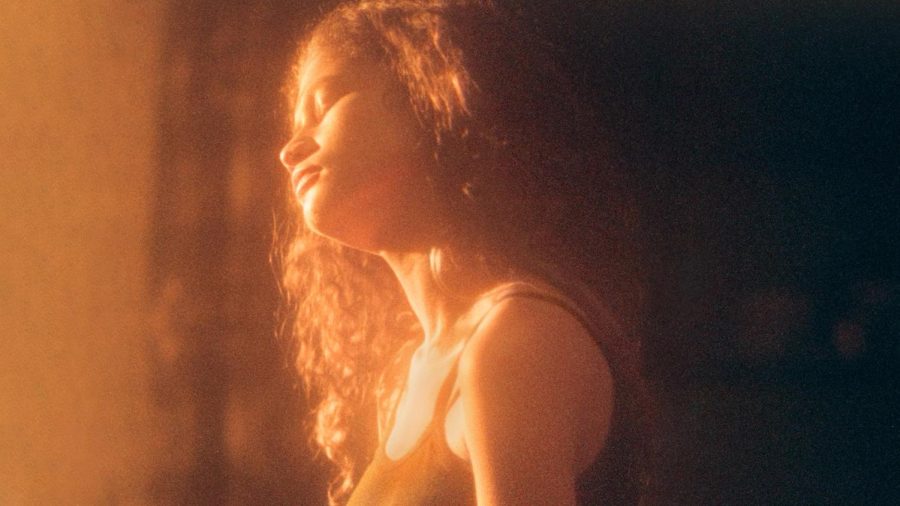Is Euphoria an Accurate Depiction of High School Life?
Euphoria follows a group of teenagers as they face mental health issues and combat drug abuse; five GEHS students share their opinion on whether or not they think the show is relatable to real life.
Jan 31, 2022
HBO Max’s hit show Euphoria starring Zendaya recently began airing its second season on the streaming platform. The show takes place in suburbia and follows high schooler Rue and her tight-knit group of friends as they try and figure out relationships, sexual orientation insecurities, and body-image insecurities, as well as combat drug abuse through beautiful cinematography and graphic scenes.
I became a fan of the show this past month and I have obsessed over not only the show’s fashion, soundtrack, cinematography, and makeup, but also over how writer Sam Levinson portrays addiction, trauma, and progresses relationships and friendships between the characters. I also love how there is a relatable character, Lexi Howard, and how I have connected with her personality through the show as we are both observers and, to be honest, think everything is just a little movie in our heads.
Because Euphoria follows a group of teenagers, I wondered if anyone else at GEHS found the show relatable, whether it be in lighthearted ways like I do with Lexi, or it be in more drastic ways with characters like Rue. Some found it very relatable, like senior Ryanne Ham.
“[I relate to] Rue,” Ham said. “I’m mixed, and I like that there’s mixed representation. Rue’s dad passed away and so did my dad of cancer, and Rue wears her dad’s sweatshirt all the time and so do I. Rue also found comfort in drugs and so did I. I’m good now, but in the moment, I could really relate.”
Freshman Avery Gates can also relate to Rue, as well as Cassie.
“[I relate to] Cassie not because I [do what she does] but because I get attached to people really fast and I trust people really fast,” Gates said. “Too fast. [I relate to] Rue because my mental health is really bad and I don’t have the best ways of dealing with it, and I almost don’t deal with it most of the time.”
Others can relate to characters in a lighthearted way.
“I feel like anyone can relate to any of the characters,” junior Paige Schesser said. “I feel like personally, I relate to Lexi the most because she sits in the back and kind of observes everyone else.”
Besides relating to characters, students can find correlations to real life in the show.
“I think [whether or not the show is relatable] depends on who you hang around with,” senior Jamilete Hernandez said. “For me, personally, I don’t really think that’s accurate of my life because I just don’t do what they do, but I wouldn’t say that others [don’t relate] because there are some high school students that have that experience.”
Senior Elyea Soileau partially agreed.
“I feel like I’ve never experienced most of the things they go through, like the drugs and all the relationship stuff,” Soileau said. “I don’t know if [Euphoria] is similar to other people’s experiences, but [it’s not relatable for] me or Gardner. I feel like we’re less likely for that stuff to happen. In my mind, it makes more sense for that to happen in a city.
Students also appreciated the beauty of the show even throughout all the darkness.
“I think their outfits and clothes and makeup is really cool,” Soileau said. “I wish I could [dress like that] but I can’t.”
Gates also shared her favorite part of the plot that made the show more entertaining for her.
“[My favorite part of Euphoria] was when Fez beats up Nate at the party that Rue and Jules are at,” Gates said.
Of course, with television shows, everything comes in a bit of an overdramatized way to meet entertainment standards.
“I feel like the parties are [overdramatized],” senior Lily Blakey said. “I don’t know anyone in high school whose parents just legitimately do not care enough about their kid or their house that has huge parties like that. I feel like that’s kind of unrealistic. I also kind of feel like some of the fights [are unrealistic] and [so is] the police involvement. I feel like the police would be a lot more involved in real life.”
Schesser thinks there is a purpose for the dramatization of the show.
“It dramatizes it so it can really get its point across,” Schesser said. “A lot of shows are scared to push those boundaries that Euphoria does. It doesn’t invalidate the struggles, it just tries to portray them in the best way possible.”
Hernandez thinks the show is a little too overdramatized.
“A lot of people deal with addiction, but when I watch Euphoria, it makes me feel like all the high school students have some kind of drug issue,” Hernandez said. “People do drugs, but it makes it look like the whole school is doing coke in the bathroom.”
Ham thinks that Euphoria is relatable, not just for her, but for many high school students.
“[Euphoria] deals with a lot of deep issues like mental health,” Ham said. “It gives a realer side to it. A lot of people think that mania is just going crazy and going shopping and spending all your money, but [Euphoria] shows Rue when she’s at her lowest and manic and how that really quickly leads to depression. [It also shows] how important it is to check up on your friends because instead of finding comfort in you, they may find comfort in things that are not good for them…I think it’s important [to know that I have struggled with addiction] because people always see people who do drugs as ‘bad kids’, but having someone who is a cheerleader, in band, choir, honor roll, etc. [shows how] easy it is to use [drugs] as a coping mechanism [and] that it can happen to anyone.”






